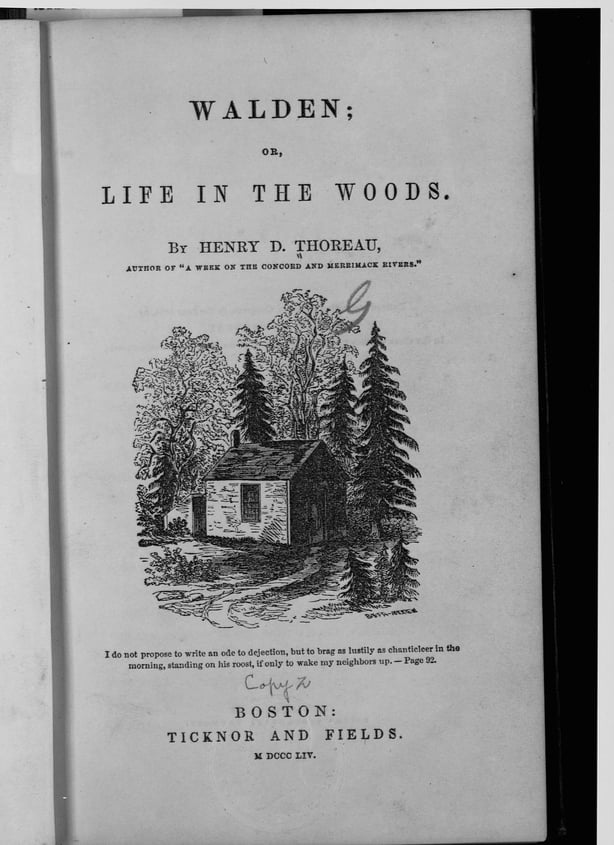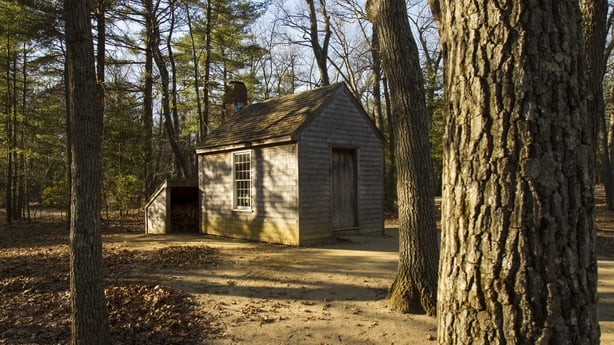As we recall the strange days of lockdown, sharing our tales of coping and perhaps not coping so well, we soon discover that our experiences have much in common, as do the changes that may have occurred within ourselves. For example, those of us blessed with a garden seem to have a greater awareness of the seasons and what each month brings – when certain flowers bloom and fade, or when new birds arrive to sing and nest and feed their chicks. In the stillness of enforced enclosure we began to see things we didn't know were there.
And while we’ve all been noticing the same things, some of us seem to have been reading the same books. I haven’t managed much fiction in the last few years but I’ve been eating poetry, science and philosophy – and many great works dealing in all three. One book mentioned by several friends and acquaintances as having being read (or re-read) is Walden: or, Life in the Woods by Henry David Thoreau – an autobiographical account published in 1854 of an attempt to live a simple and solitary life in natural surroundings, free from the ways of work, money and the "quiet desperation" of normal life. No wonder people are reading it...

Walden: or, Life in the Woods
For two years Thoreau lived in a hut he built for himself on the banks of Walden Pond, a mile and a half from his hometown of Concord, Massachusetts. Sure, he nipped home the odd time for a feed, or to get his washing done, but that shouldn’t take away from what was, among many other things, a deeply serious spiritual quest – the author’s thinking influenced by his relationship with the leading figure in American Transcendentalism, Ralph Waldo Emerson. Not only had Emerson given Thoreau the land for this experiment in living, he had earlier posed the question in his book Nature (1836) "Why should we not also enjoy an original relationship to the universe?"
The Transcendentalists, a hugely influential intellectual movement based around the town of Concord, believed in the inherent divinity of the individual, while also calling on citizens to act together to tackle the world’s problems – an odd mix of American individualism and a deep commitment to society. And while Thoreau may now be the movement’s most famous name, Emerson was the original, enlightened force.

A Unitarian preacher, Emerson believed that nature was a divine text, and that knowledge of God was there to be read, without any further assistance from dogma or ideology – an approach that greatly appealed to Thoreau. So too did those Transcendentalist ideas akin to the New Testament assertion that "the kingdom of God is within you." Ancient Hindu, Islamic, Buddhist and Confucian learning was also in the rich Transcendentalist mix, plus healthy doses of German Romanticism and the poems of Wordsworth and Coleridge – two poets who knew this territory well.
And so, with all this and more – what he called "the wisdom of mankind" – and a wide-ranging set of abilities unique to himself, Thoreau built his hut, chopped his logs, stared into the pond, fished for pickerling, gathered berries and observed the seasons change. As Wordsworth had instructed, he let Nature be his teacher. He watched the ice melt, the plants bloom and the animals slowly approach. Before long the birds of New England almost forgot he was there – just a man trying to keep it very simple, and live his life to the full.
"Only that day dawns," Thoreau concludes, "to which we are awake. There is more day to dawn. The sun is but a morning star."
Walden by Henry David Thoreau is published by Oxford World Classics. Mystery Train with John Kelly, RTÉ lyric fm, Mon - Thu @ 7pm - listen back here. Watch highlights from The Works Presents with John Kelly here.


